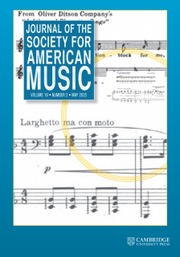No CrossRef data available.
Article contents
All in the Family: Brandeis University and Leonard Bernstein's “Jewish Boston”
Published online by Cambridge University Press: 15 January 2009
Abstract
This article examines Leonard Bernstein's affiliation with Brandeis University, where he served as a faculty member from 1951 to 1956, a Fellow from 1956 to 1976, a Trustee from 1976 to 1980, and a Trustee Emeritus from 1980 until his death in 1990. In particular, the article explores why Bernstein chose to spend his time in Waltham. By the early 1950s he had already achieved celebrity and was busy with multiple conducting and composition projects; why did he commit to teaching at Brandeis and supporting the school until the end of his life? Bernstein's commitment to Brandeis appears to have been a manifestation of his ongoing connection and sense of duty to the Boston Jewish community of his childhood and, more specifically, to his father. This article summarizes Bernstein's activities at Brandeis, gives a brief history of the university, and discusses the ways in which Brandeis can be understood as an expression of Bernstein's ties to Boston's Jewish life, as well as to the Jewish immigrant experience of his parents and their generation.
- Type
- Research Article
- Information
- Journal of the Society for American Music , Volume 3 , Special Issue 1: Leonard Bernstein in Boston , February 2009 , pp. 85 - 100
- Copyright
- Copyright © The Society for American Music 2009


